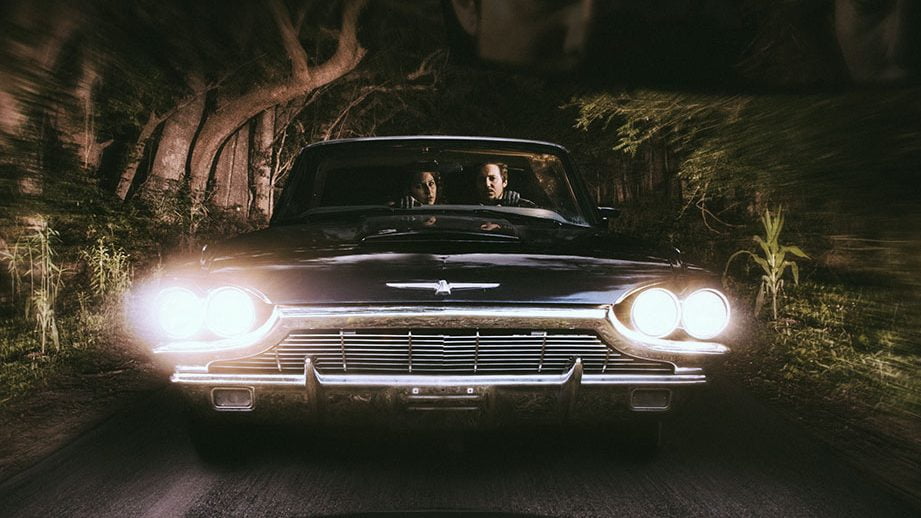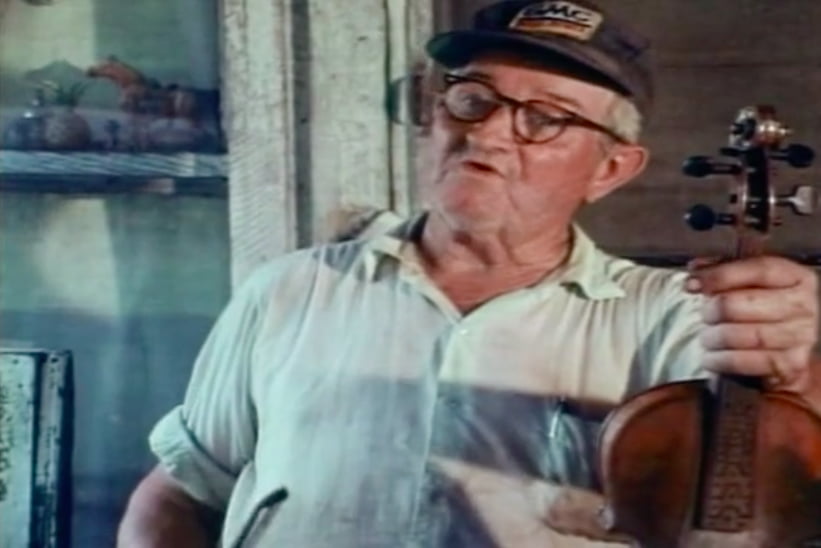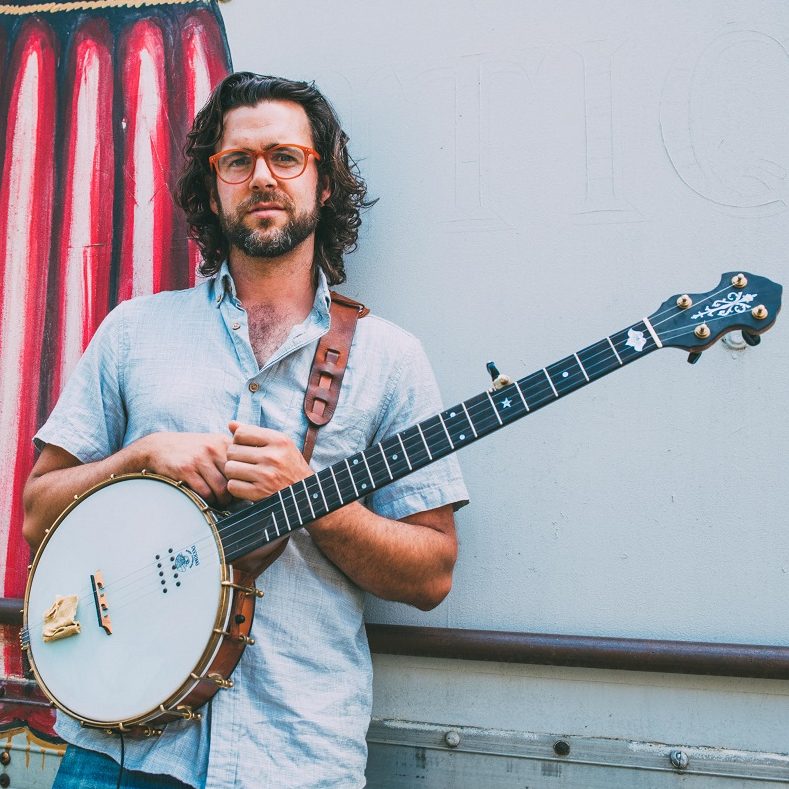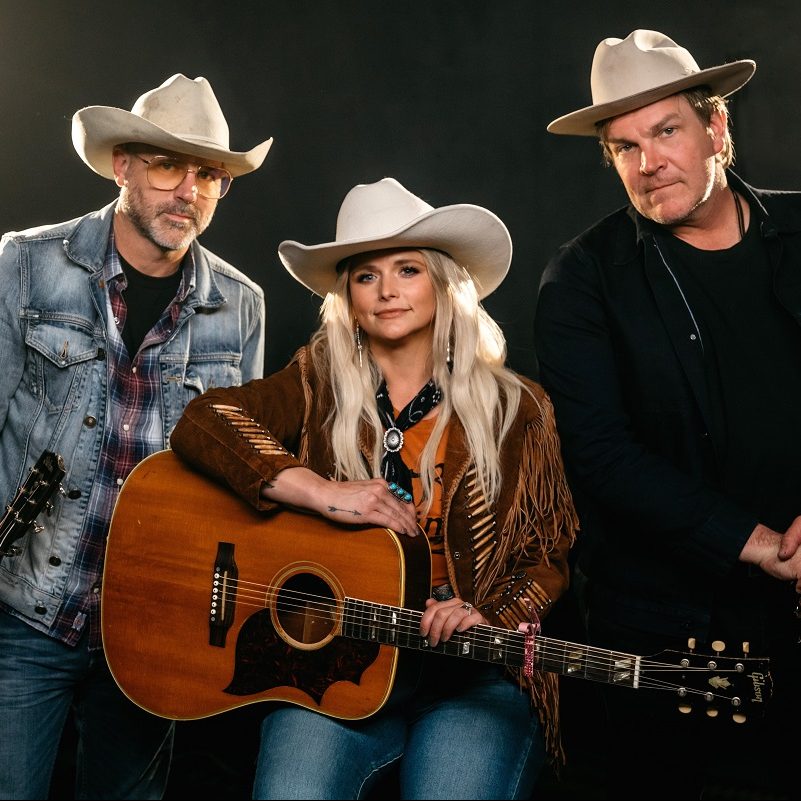When Shovels & Rope played the Vogue in Indianapolis recently — on just the second show of their current tour — the stage looked like it was ready for a much bigger band. There was the drumkit in the center, just a kickdrum and a snare, with a small keyboard possibly duct-taped to it. There were a few guitars, plus an electric piano on stage left. The backdrop was a wall of wooden pallets, worn and weathered from use. It was a big stage for a big room, but there were never more than two people up there, trading off instruments and creating a mighty racket.
“We’re a little tiny band, but we make a lot of noise,” says Cary Ann Hearst, one half of the duo. “We do have a little bit of set design now and a lighting set that makes us look really cool. It’s a way to grow the visual part of what we do.” Shovels & Rope may be getting bigger, but the band remains resolutely small.
Eight years and four albums into their career, Shovels & Rope is still a duo featuring the wife-husband team of Hearst and Michael Trent. On the new Little Seeds — their first for New West Records and their debut as parents — they ramble recklessly from the pedal-to-the-metal storytelling of “Botched Execution” to the heart-on-sleeve thanksgiving of “St. Anne’s Parade.” It’s one of the most bracing and original albums of the year, simultaneously tender and tough, wiry and wounded, punk and country.
Did playing in bigger rooms and even signing with a bigger label change how you approached playing live shows or touring?
Michael Trent: No, not really. Along the way, we have played some larger rooms. We played all types of places — coffeeshops to arena-type places — when we opened for Jack White. I feel like we just do what we do, and hopefully people will come along for the ride. We’re lucky enough that our audience is pretty rock ‘n’ roll, but they will calm down a little bit and appreciate some of the more tender moments in the set.
Are you thinking about a live show when you’re recording?
Cary Ann Hearst: No. Michael can do whatever he wants in the studio.
MT: You don’t want to make something that you don’t sound anything like. I wouldn’t want to put in a bunch of bass and cymbals. When we’re in the studio, it’s in the back of my mind what we can get away with and not, what we can re-create and still make equally impactful in a live show.
The one I keep thinking about in those terms is “Buffalo Nickel,” which has that great drumbeat that sounds like Rick Rubin. It sounds like Jay-Z’s “99 Problems.”
CAH: Thank you for that kickass compliment. Michael made an analogy today about that: “Our sound is like a parking lot. You can drive all around the parking lot, cruising into different corners and exploring what was there, instead of it being like a linear highway that you follow along the course of your career.” I thought that was pretty genius for Michael to say that.
MT: We’re still sort of figuring it out as we go, but that’s also part of the fun for us. We’ve got to think on our feet and get creative with what two people can do with four arms and four legs. It’s four, right?
CAH: Yeah, four.
MT: All of that stuff is really fun to try to bring to life in front of an audience. A lot of the songs, like “Johnny Come Outside,” they’re pretty sing-songy, and there is nothing too particularly out there about any of them. I think they tell a good story, so they are fun to play.
To me, on this album, there is an interesting mix in the songwriting. There are some songs that sound like fiction, like “Botched Execution,” versus something that sounds like nonfiction, like “The Last Hawk.”
MT: I think you’re on base. We enjoy character-based songwriting and have explored that over the past few years. We did write some personal songs on here, and “The Last Hawk” was personal — not to our own lives, but trying to pay tribute to Garth [Hudson].
CAH: We read an article about Garth Hudson visiting Big Pink for the last time. He recently went there for some reason. I don’t know why we were both so moved. It’s like time is going by, and you look at it over the course of your lifetime — the little choices that you’ve made, the tiny things that you do that made the biggest difference, little things that you couldn’t have anticipated. Like Michael said, while that song is not about us, it’s about Garth and life as a band. Life is going by, and you look up astounded at the little things that made all the difference.
That idea seems to inform a lot of these songs, especially “St. Anne’s Parade.”
CAH: We didn’t realize it when we were writing that song. We were coming home from New Orleans after a road trip for a friend’s wedding. Now more time has passed, and those friends just celebrated the birth of their first daughter. Life keeps on moving forward.
MT: We didn’t set out to make a record about songs with some of these events and home life on them. It just happened. They are songs honoring some of these people who were dealing with things such as Alzheimer and loss of loved ones.
CAH: We would have happily skipped most of it, as far as the events that inspired the songs. I would rather have never had the songs to sing. I could always find some other damn song to sing.
I think that’s what makes the last couple of songs so powerful, especially “Eric’s Birthday,” which features a recording of his mother telling the story of how he was born. I didn’t know Eric [Brantley], but I saw that he had died. That song gave me a picture of this person and an idea of what he meant to you.
MT: It was a beautiful moment when Suzanne was telling that story. We discussed it before we put it on here and made sure she was okay with it. We had to think long and hard about it, just because of the personal nature of it. In the end, it seems like the universal sentiment was a beautiful moment in time, like there were people gathered together celebrating somebody’s life and grieving and having a laugh about this fantastic story of how he was born. Everybody was laughing through the tears, and it just felt like a real universal sentiment.
CAH: Obviously, you have to respect the legalities and the privacy that people are entitled to, but there’s another side of it. They’re your own personal memories, the conversations that you have and the voices of people you love. Often, they’re lost to time. So these recordings are like little movies on your phone. We’ve got recordings of our own family and friends that will always be with us. We’ve got their voices so that we can play them for our daughter in five or 10 years. Here’s that little conversation she had with her grandmother. I have those from when I was a little kid. I think that’s’ a great way to archive a life. It doesn’t have to be every waking moment, but just any little precious moment.
It definitely seems to underscore how precious some of those small moments in life can be. On “Eric’s Birthday,” it’s not even about the story itself, but the way she’s telling it. I think that makes it very relatable to people who never knew him.
CAH: I think that’s why she was okay with us sharing such a sensitive and intimate period of her life. For one, it’s not anonymous to us in any way, but we’re careful to protect that moment. We are personally so grateful to talk about Eric and his life. That’s the unseen side effect of sharing this story on the record. We’re sensitive to her feelings, and we would never want to exploit his family. It’s not a way to capitalize on his loss. It’s a way for us to share that experience with other people who have also lost somebody and have had to find a way to celebrate that person.
Do you mind if I ask what her reaction was to the finished recording?
MT: I had been in touch with a close friend of hers. I didn’t have her contact information, but I was able to send it to her. It was a very sensitive time, and they were still moving his stuff. But I felt like she might want to hear it. There wasn’t a plan to put it on the record until we found out what she thought of it. She got right back to us and told us it made her happy. She thanked us for it. And then later, when she listened to the whole record, she reached out and just said thank you. That’s the most you can hope for — that it helped her a little bit.
We were talking about how these songs are fun to play, but that quality is balanced out by the gravity of a moment like “Mourning Song.”
CAH: When you’re putting an album together, you’re hoping for a nice balance. We may come to a place in our lives where we need to write a really sad record, or a record that’s nothing but rock ‘n’ roll, but our writing tends to be balanced anyway. When we put these songs together, that balance is kind of there. We did it by accident, but we’re glad it worked out that way.
How were these sessions different than from previous albums?
CAH: We had a newborn in the house, first of all.
That will make a big difference.
CAH: My availability was limited, and there was a sense of urgency, in the sense that Michael and I don’t really do very many takes of anything. This time we had three or four takes, and if it wasn’t catching, we had to move on. There’s an immediacy that we strive for. We’ve always had self-imposed deadlines, and this was no different. We were under pressure — self-imposed, gentle pressure. I don’t know if you have kids, but there’s a helplessness for dad in those first three or four months. He might not have a whole lot of energy left after taking care of me and the baby and the house, but he has to focus that on the record. He saved the day everyday.
MT: Of course, I was kind of useless in the infant department for a while, but I did have plenty of time to go upstairs and play. It was definitely a struggle to try to get schedules lined up and not make too much noise when the baby was asleep. At the time, it was pretty intense, but it really couldn’t have worked out better in hindsight.
You were talking about the self-imposed time constraints. What prompts that kind of limitation on yourself?
CAH: We make a living by touring. We don’t really make a living selling physical copies of records. We’re on the road all the time. When we have a window, we have to make time for recording. We honestly can’t afford not to live on the road. We can’t really stay home and take a year to make a record. We don’t really operate that way. I know a lot of people who can work that way, and thank God they make great records. That’s not the way we do it. These windows of time and these deadlines keep us going. It keeps us on task to always be writing and to know when an opportunity to make a record is coming. It’s pretty much just dictated by necessity.
MT: Since we have to crack a whip on ourselves, we just set personal deadlines, but I just feel we work best that way. If you have too much room to roam, it’s just like having too many options. I’d rather have an amplifier with three knobs on it rather than one with 20 knobs. I know the limitations of it and I can work within that box a little easier. I feel like having too many options is not the best way to work, for me specifically.
CAH: I think some people can use anything and some people need limitations. I’m not art expert, but I think Andy Warhol could do both. He started with nothing, built the Factory, then when he has unlimited resources, he kind of sticks to his visual. You always know you’re looking at a Warhol. By no means do I mean to compare us to an artist like that.
MT: Some of our heroes are great limiters. Jack White is somebody who has whatever resources available to him, yet he still keeps himself limited, just to keep the pressure on himself. He operates best when someone’s poking him with a sharp stick. I feel like we also thrive with a little bit of struggle. Take the critter that can be the most adaptive in whatever type of environment, and that’s the critter that gets to make extra critters.
CAH: It’s us two on stage, but as we grow, there’s this little family that we travel with. Our sound man who is also our tour manager, and now we’ve got a merchandise person running that whole end of our business. Julie the nanny is taking care of the baby. Now there’s a lighting designer making sure that we look pretty and the homemade set that our tour manager built is illuminated with cool graphics. It’s still small, but there are way more people making it happen, way more little elements that make it special.
MT: We still feel inspired and creatively satisfied, eager to explore, eager to try new things. It’s nice to be in that position. Who knows where it’s going to go next? Maybe we put out a noise record. Maybe we’ll put out a record that’s all …
CAH: … accordion playing.
To read about another band breaking down barriers, check out Stephen’s interview with Chatham County Line.



